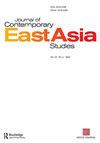Trade, security, and authoritarianism: domestic politics of foreign policy making in China
IF 1.4
Q1 AREA STUDIES
引用次数: 2
Abstract
ABSTRACT Could trade bring security and stability to international relations? China has become one of the most important players in the global economy without being democratized. In this article, I present a game-theoretic model in which an authoritarian state would behave more cooperatively in international relations if internationalists are empowered vis-à-vis hardliners in domestic politics. Reformists and internationalists are likely partners. The reformists have a strong incentive to use the free trade agreements’ (FTAs) stipulating domestic regulations as external pressure to advance structural reforms: they see intra-industry trade, enhanced by global value chains (GVCs), as a means to achieve sustainable economic growth. This article breaks down the broader claim that FTAs regulating GVCs-based intra-industry trade are connected to regional security in two steps: first, FTAs empower the reformist-internationalist coalition; and second, the empowered reformist internationalists make the state’s behavior more cooperative in the international sphere. The model’s equilibrium outcome implies that the FTAs that require the signatories to be committed to domestic economic reforms will promote international cooperation and strengthen regional security by empowering people who favor reform and internationalism in each state’s domestic politics. This means, if an authoritarian state is involved in the global economy and benefits from international economic transactions, like China does, then concluding and spreading FTAs requiring domestic economic reforms would be more effective policy to bring security and stability than promoting democratic transitions.贸易、安全与威权主义:中国外交政策制定中的国内政治
贸易能给国际关系带来安全与稳定吗?在没有民主化的情况下,中国已经成为全球经济中最重要的参与者之一。在这篇文章中,我提出了一个博弈论模型,在这个模型中,如果国际主义者在国内政治中被授权对抗-à-vis强硬派,专制国家将在国际关系中表现得更加合作。改革派和国际主义者可能是合作伙伴。改革派有强烈的动机利用自由贸易协定(FTAs)规定的国内法规作为推进结构性改革的外部压力:他们将全球价值链(GVCs)促进的产业内贸易视为实现可持续经济增长的手段。本文将从两个方面对“规范基于全球价值链的产业内贸易的自由贸易协定与地区安全有关”这一更广泛的主张进行剖析:首先,自由贸易协定赋予了改良主义者-国际主义者联盟权力;第二,被赋予权力的改革派国际主义者使国家在国际领域的行为更加合作。该模型的均衡结果表明,要求签署国致力于国内经济改革的自由贸易协定将通过赋予在每个国家的国内政治中支持改革和国际主义的人权力,促进国际合作并加强地区安全。这意味着,如果一个威权国家像中国一样参与全球经济,并从国际经济交易中获益,那么,与促进民主转型相比,签订和扩大要求国内经济改革的自由贸易协定将是带来安全和稳定的更有效政策。
本文章由计算机程序翻译,如有差异,请以英文原文为准。
求助全文
约1分钟内获得全文
求助全文
来源期刊

Journal of Contemporary East Asia Studies
Social Sciences-Cultural Studies
CiteScore
2.50
自引率
0.00%
发文量
10
审稿时长
6 weeks
 求助内容:
求助内容: 应助结果提醒方式:
应助结果提醒方式:


